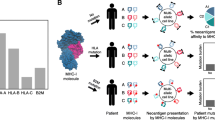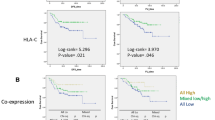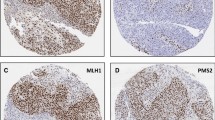Abstract
HLA class I (HLA-I) molecules play a crucial role in the presentation of tumor antigenic peptides to CD8+ T cells. Tumor HLA-I loss provides a route of immune escape from T cell-mediated killing. We analyzed HLA-I expression in 98 cryopreserved breast cancer tissues using a broad panel of anti-HLA-I antibodies. Genomic HLA-I typing was performed using DNA obtained from autologous normal breast tissue. Analysis of the loss of heterozygosity (LOH) in the HLA-I region of chromosome 6 (LOH-6) and in the β2-microglobulin (B2M) region of chromosome 15 (LOH-15) was done by microsatellite amplification of DNA isolated from microdissected tumor areas. B2M gene sequencing was done using this DNA form HLA-I-negative tumors. Immunohistological analysis revealed various types of HLA-I alterations in 79 tumors (81%), including total HLA-I loss in 53 cases (54%) and partial loss in 16 samples (14%). In 19 cases (19%), HLA-I expression was positive. Using microsatellite analysis, we detected LOH in 36 cases out of 92 evaluated (39%), including 15 samples with only LOH-6, 14 with LOH-15, and seven tumors with LOH-6 and LOH-15 at the same time. Remarkably, we detected LOH-6 in eight tumors with positive HLA-I immunolabeling. We did not find any B2M mutations in HLA-I-negative breast tumors. In conclusion, LOH at chromosomes 6 and 15 has a high incidence in breast cancer and occurs in tumors with different HLA-I immunophenotypes. This common molecular mechanism of HLA-I alterations may reduce the ability of cytotoxic T lymphocytes to kill tumor cells and negatively influence the clinical success of cancer immunotherapy.


Similar content being viewed by others
Explore related subjects
Discover the latest articles and news from researchers in related subjects, suggested using machine learning.Abbreviations
- HLA:
-
Human leukocite antigens
- MHC:
-
Major histocompatibility antigens
- LOH:
-
Loss of heterozygosity
- Β2Μ:
-
Beta-2-microglobilin
- FFPE:
-
Formalin fixed paraffin embedded
- IDC:
-
Infiltrating ductal carcinoma
- ILC:
-
Infiltrating lobular carcinoma
- TNM:
-
Tumor-node-metastasis
- ER:
-
Estrogen receptor
- PgR:
-
Progesterone receptor
- SSO:
-
Sequence-specific oligonucleotide analysis
- STR:
-
Short tandem repeat
References
Aptsiauri N, Cabrera T, Mendez R, Garcia-Lora A, Ruiz-Cabello F, Garrido F (2007) Role of altered expression of HLA class I molecules in cancer progression. Adv Exp Med Biol 601:123–131
Aptsiauri N, Garcia-Lora A, Garrido F (2014) ‘Hard’ and ‘soft’ loss of MHC class I expression in cancer cells. In Tumor Immunology and Immunotherapy. Edited by Rees RC. Oxford University Press, 63–78
Barnstable CJ, Bodmer WF, Brown G, Galfre G, Milstein C, Williams AF, Ziegler A (1978) Production of monoclonal antibodies to group A erythrocytes, HLA and other human cell surface antigens-new tools for genetic analysis. Cell 14(1):9–20
Bernal M, Ruiz-Cabello F, Concha A, Paschen A, Garrido F (2012) Implication of the β2-microglobulin gene in the generation of tumor escape phenotypes. Cancer Immunol Immunother 61(9):1359–1371
Boesen M, Svane IM, Engel AM, Rygaard J, Thomsen AR, Werdelin O (2000) CD8+ T cells are crucial for the ability of congenic normal mice to reject highly immunogenic sarcomas induced in nude mice with 3-methylcholantrene. Clin Exp Immunol 121:210–215
Burrone OR, Kefford RF, Gilmore D, Milstein C (1985) Stimulation of HLA-A,B,C by IFN-alpha. The derivation of Molt 4 variants and the differential expression of HLA-A,B,C subsets. EMBO J 4(11):2855–2860
Cabrera T, Ruiz-Cabello F, Lopez MA, de la Higuera B, Sanchez M, Garrido F (1986) Characterization of monoclonal antibodies directed against HLA class II molecules. Hybridoma 5(3):191–197
Cabrera T, Fernandez MA, Sierra A, Garrido A, Herruzo A, Escobedo A, Fabra A, Garrido F (1996) High frequency of altered HLA class I phenotypes in invasive breast carcinomas. Hum Immunol 50:127–134
Cabrera T, Lopez-Nevot MA, Gaforio JJ, Ruiz-Cabello F, Garrido F (2003) Analysis of HLA expression in human tumor tissues. Cancer Immunol Immunother 52:1–9
Carretero R, Cabrera T, Sáenz-López P, Maleno I, Aptsiauri N, Cózar JM, Garrido F (2011) Bacillus Calmette-Guerin immunotherapy of bladder cancer induces selection of human leukocyte antigen class I-deficient tumor cells. Int J Cancer 129(4):839–846
Concha A, Cabrera T, Ruiz-Cabello F, and Garrido F. Can the HLA phenotype be used as a prognostic factor in breast carcinomas? Int J Cancer, 1991a; Suppl 6, 146–54
Concha A, Esteban F, Cabrera T, Ruiz-Cabello F, Garrido F (1991b) Tumor aggressiveness and MHC class I and II antigens in laryngeal and breast cancer. Semin Cancer Biol 2:47–54
Coulie PG, Van den Eynde BJ, van der Bruggen P, Boon T (2014) Tumour antigens recognized by T lymphocytes: at the core of cancer immunotherapy. Nat Rev Cancer 14(2):135–146
Del Mar Valenzuela-Membrives M, Perea-García F, Sanchez-Palencia A, Ruiz-Cabello F, Gómez-Morales M, Miranda-León MT, Galindo-Angel I, Fárez-Vidal ME (2016) Progressive changes in composition of lymphocytes in lung tissues from patients with non-small-cell lung cancer. Oncotarget 7:71608–71619
Garrido F, Algarra I (2001) MHC antigens and tumor escape from immune surveillance. Adv Cancer Res 83:117–158
Garrido F, Cabrera T, Concha A, Glew S, Ruiz-Cabello F, Stern PL (1993) Natural history of HLA expression during tumour development. Immunol Today 14:491–499
Garrido F, Ruiz-Cabello F, Cabrera T, Perez-Villar JJ, Lopez-Botet M, Duggan-Keen M, Stern PL (1997a) Implications for immunosurveillance of altered HLA class I phenotypes in human tumours. Immunol Today 18:89–95
Garrido, T. Cabrera, R.S. Accola, J.C. Bensa, W. Wodmer, G. Dohr, B. Drenou, M. Drouet, R. Fauchet, G.B. Ferrara, S. Ferrone, P. Giacomini, T. Kageshita, L. Koopman, M. Maio, F. Marincola, C. Mazzilli, P.A. Morell, A. Murray, Crh. Papasteriades, L. Salvaneschi, P.L. Stern, A. Ziegler. HLA and cancer: 12th International Histocompatibility workshop study. In: Genetic diversity of HLA. Functional and Medical Implications. EDK (Ed. by D. Charron) vol. I, 1997b; 445–452
Garrido F, Algarra I, García-Lora AM (2010a) The escape of cancer from T lymphocytes: immunoselection of MHC class I loss variants harboring structural-irreversible "hard" lesions. Cancer Immunol Immunother 59(10):1601–1606
Garrido F, Cabrera T, Aptsiauri N (2010b) ‘Hard’ and ‘soft’ lesions underlying the HLA class I alterations in cancer cells: implications for immunotherapy. Int J Cancer 127:249–256
Garrido F, Aptsiauri N, Doorduijn EM, Garcia Lora AM, van Hall T (2016) The urgent need to recover MHC class I in cancers for effective immunotherapy. Curr Opin Immunol 39:44–51
Garrido F, Ruiz-Cabello F, Aptsiauri N (2017a) Rejection versus escape: the tumor MHC dilemma. Cancer Immunol Immunother 66:259–271
Garrido F, Perea F, Bernal M, Sánchez-Palencia A, Aptsiauri N, Ruiz-Cabello F. The escape of cancer from T cell-mediated immune surveillance: HLA class I loss and tumor tissue architecture. Vaccines (Basel). 2017b Feb 27;5(1)
Herrmann F, Lehr HA, Drexler I, Sutter G, Hengstler J, Wollscheid U, Seliger B (2004) HER-2/neu-mediated regulation of components of the MHC class I antigen-processing pathway. Cancer Res 64:215–220
Kaneko K, Isihigami S, Kijima Y, Funasako Y, Hirata M, Okumura H, Shinchi H, Koriyama C, Ueno S, Yoshinaka H, Natsugoe S (2011) Clinical implication of HLA class I expression in breast cancer. BMC Cancer 11:454–459
de Kruijf EM, van Nes JG, Sajet A, Tummers QR, Putter H, Osanto S, Speetjens FM, Smit VT, Liefers GJ, van de Velde CJ, Kuppen PJ (2010) The predictive value of HLA class I tumor cell expression and presence of intratumoral Tregs for chemotherapy in patients with early breast cancer. Clin Cancer Res 16:1272–1280
del Campo AB, Kyte JA, Carretero J, Zinchencko S, Mendez R, Gonzalez-Aseguinolaza G, Ruiz-Cabello F, Aamdal S, Gaudernack G, Garrido F, Aptsiauri N (2014) Immune escape of cancer cells with beta2- microglobulin loss over the course of metastatic melanoma. Int J Cancer 134:102–113
López Nevot MA, Ruiz-Cabello F, Huelin C, Cabrera A, Garrido F (1986) A monoclonal antibody produced against the surface immunoglobulin of B-prolymphocytic leukemia. Sangre (Barc) 31(6):751–758
Lopez-Nevot MA, Esteban F, Ferron A, Gutierrez J, Oliva MR, Romero C, Huelin C, Ruiz-Cabello F, Garrido F (1989) HLA class I gene expression on human primary tumours and autologous metastases: demonstration of selective losses of HLA antigens on colorectal, gastric and laryngeal carcinomas. Br J Cancer 59:221–226
Madjd Z, Spendlove I, Pinder SE, Ellis IO, Durant L (2005) Total loss of MHC class I is an independent indicator of good prognosis in breast cancer. Int J Cancer 117:248–255
Maleno I, Aptsiauri N, Cabrera T, Gallego A, Paschen A, López-Nevot MA, Garrido F (2001) Frequent loss of heterozygosity in the □2-microglobulin region of chromosome 15 in primary human tumors. Immunogenetics 63(2):65–71
Maleno I, Cabrera CM, Cabrera T, Paco L, Lopez-Nevot MA, Collado A, Ferron A, Garrido F (2004) Distribution of HLA class I altered phenotypes in colorectal carcinomas: high frequency of HLA haplotype loss associated with loss of heterozygosity in chromosome region 6p21. Immunogenetics 56:244–253
Maleno I, Romero JM, Cabrera T, Paco L, Aptsiauri N, Cozar JM, Tallada M, Lopez-Nevot MA, Garrido F (2006) LOH at 6p21.3 region and HLA class altered phenotypes in bladder carcinomas. Immunogenetics 58(7):503–510
Marincola FM, Jafee EM, Hicklin DJ, Ferrone S (2000) Escape of human solid tumors from T cell recognition: molecular mechanisms and functional significance. Adv Immunol 74:181–273
McGranaham N, Rosenthal R, Hiley C, Rowan AJ, Watkins T, Wilson G, Birkbak N, Veeriah S, Van Loo P, Herrero J, Swanton C, TRACERx Consortium (2017) Allele-specific HLA loss and immune escape in lung cancer evolution. Cell 171(6):1259–1271
Neefjes JJ, Ploegh HL (1988) Allele and locus-specific differences in cell surface expression and the association of HLA class I heavy chain with beta 2-microglobulin: differential effects of inhibition of glycosylation on class I subunit association. Eur J Immunol 18(5):801–810
Pedersen MH, Hood BL, Beck HC, Conrads TP, Ditzel HJ, Leth-Larsen R (2017) Downregulation of antigen presentation-associated pathway proteins is linked to poor outcome in triple-negative breast cancer patient tumors. 6(5):e1305531. https://doi.org/10.1080/2162402X.2017.1305531 eCollection 2017
Perea F, Bernal M, Sanchez-Palencia A, Carretero J, Torres C, Bayarri C, Gomez-Morales GF, Ruiz-Cabello F (2017) The absence of HLA class I expression in non-small cell lung cancer correlates with the tumor tissue structure and the pattern of T cell infiltration. Int J Cancer 140:888–899
Perez M, Cabrera T, Lopez Nevot MA, Gomez M, Peran F, Ruiz-Cabello F, Garrido F (1986) Heterogeneity of the expression of class I and II HLA antigens in human breast carcinomas. J Immunogenet 13:247–253
Ramal LM, Feenstra M, van der Zwan AW, Collado A, Lopez-Nevot MA, Tilanus M, Garrido F (2000) Criteria to define HLA haplotype loss in human solid tumors. Tissue Antigens 55:443–448
Romero P, Coulie P (2014) Adaptive T-cell immunity and tumor antigen recognition. Tumor Immunology and Immunotherapy. Edited by Rees RC. Oxford University Press, In, pp 1–14
Ryschich E, Notzel T, Hinz U, Autschbach F, Ferguson J, Simon I, Weitz J, Frohlich B, Klar E, Buchler MW, Schmidt J (2005) Control of T-cell-mediated immune response by HLA class I in human pancreatic carcinoma. Clin Cancer Res 11(Pt 1):498–504
Sade-Feldman M, Jiao YJ, Chen JH, Rooney MS, Barzily-Rokni M, Eliane JP, Bjorgaard SL, Hammond MR, Vitzthum H, Blackmon SM, Frederick DT, Hazar-Rethinam M, Nadres BA, Van Seventer EE, Shukla SA, Yizhak K, Ray JP, Rosebrock D, Livitz D, Adalsteinsson V, Getz G, Duncan LM, Li B, Corcoran RB, Lawrence DP, Stemmer-Rachamimov A, Boland GM, Landau DA, Flaherty KT, Sullivan RJ, Hacohen N (2017) Resistance to checkpoint blockade therapy through inactivation of antigen presentation. Nature Communications 8(1):1136–1143
Seliger B, Kiessling R (2013) The two sides of HER2/neu: immune escape versus surveillance. Trends Mol Med 19(11):677–684
Seliger B, Cabrera T, Garrido F, Ferrone S (2002) HLA class I antigen abnormalities and immune escape by malignant cells. Semin Cancer Biol 12:3–13
Sobin L, Gospodarowiaz M, Wittekind CH. TNM classification of malignant tumours. UICC 2009, 7th edn. Chichester: Wiley, 2010; 310p
Spear BT, Kornbluth J, Strominger JL, Wilson DB (1985) Evidence for a shared HLA-A intralocus determinant defined by monoclonal antibody 131. J Exp Med 162(6):1802–1810
Vertuani S, Triulzi C, Roos AK, Charo J, Norell H, Lemonnier F, Pisa P, Seliger B, Kiessling R (2009) HER-2/neu mediated down-regulation of MHC class I antigens processing prevents CTL-mediated tumor recognition upon DNA vaccination in HLA-A2 transgenic mice. Cancer Immunol Immunother 58:653–654
Wang E, Worschech A, Marincola FM (2008) The immunological constant of rejection. Trends Immunol 29:256–262
Zacharakis N, Chinnasamy H, Black M, Xu H, Lu YC, Zheng Z, Pasetto A, Langhan M, Shelton T, Prickett T, Gartner J, Jia L, Trebska-McGowan K, Somerville RP, Robbins PF, Rosenberg SA, Goff SL, Feldman SA (2018 Jun) Immune recognition of somatic mutations leading to complete durable regression in metastatic breast cancer. Nat Med 24(6):724–730
Zaretsky JM, Garcia-Diaz A, Shin DS, Escuin-Ordinas H, Hugo W, Hu-Lieskovan S, Torrejon DY, Abril-Rodriguez G, Sandoval S, Barthly et al (2016) Mutations associated with acquired resistance to PD-1 blockade in melanoma. N Engl J Med 375(9):819–829
Acknowledgements
We would like to thank Antonia Martín Casares for the technical support in HLA typing and Amanda Rocío González-Ramírez for the statistical analysis of the obtained results.
Funding
This work was supported by the grants from Spanish Institute of Health Carlos III (ISCIII, Instituto Carlos III) co-financed by European Union (FEDER-Fondo Europeo de Desarrollo Regional) (PI12/02031, PI08/1265, PI11/01022, PI11/01386, RETIC RD 06/020, RD09/0076/00165, PT13/0010/0039, PI14/01978, PI16/00752, PI17/00197), the Junta de Andalucía in Spain (Groups CTS-143), and Beckman-Coulter. This study is part of the doctoral thesis of Maria A. Garrido.
Author information
Authors and Affiliations
Corresponding authors
Ethics declarations
Ethical approval
All procedures performed in studies involving human participants were in accordance with the ethical standards of the institutional and/or national research committee and with the 1964 Helsinki declaration and its later amendments or comparable ethical standards.
The study protocol was approved by the ethical committee of the Virgen de las Nieves University Hospital and Instituto de Investigación Biosanitaria “ibs. Granada” (Comité de Ética de la Investigación de Centro de Granada (CEI Granada), number 2014-22/12). Signed informed consent approved by the Ethics Committee of our institution was obtained from all the patients.
Competing interest
The authors declare that they have no competing interests.
Rights and permissions
About this article
Cite this article
Garrido, M.A., Rodriguez, T., Zinchenko, S. et al. HLA class I alterations in breast carcinoma are associated with a high frequency of the loss of heterozygosity at chromosomes 6 and 15. Immunogenetics 70, 647–659 (2018). https://doi.org/10.1007/s00251-018-1074-2
Received:
Revised:
Accepted:
Published:
Issue Date:
DOI: https://doi.org/10.1007/s00251-018-1074-2




